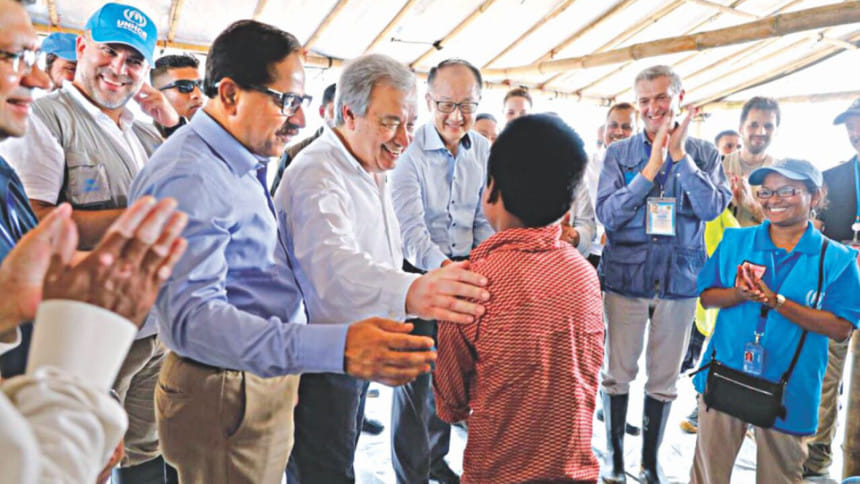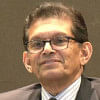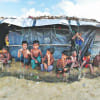Call for justice, safe return

As he walked through the alleys of the makeshift camps in rains and met Rohingya boys and girls, he remembered his granddaughters and tried to imagine what it would be like to see them in such conditions.
And he felt heartbroken as he listened to the Rohingya men and women -- their stories of cruelty and abuses in Rakhine State of Myanmar and subsequent escape.
"In Cox's Bazar, Bangladesh, I've just heard unimaginable accounts of killing and rape from Rohingya refugees who recently fled Myanmar. They want justice and a safe return home," said UN Secretary-General António Guterres in a tweet as he visited the camps yesterday.
In another tweet, the UN chief said nothing could've prepared him for the scale of crisis and extent of suffering he saw in Cox's Bazar. "I heard heartbreaking accounts from Rohingya refugees that will stay with me forever.
"My appeal to the int'l community is to step up support."
Guterres arrived in Cox's Bazar from Dhaka on a special flight of Biman Bangladesh Airlines at 8:45am yesterday, accompanied by World Bank President Jim Yong Kim and UN High Commissioner for Refugees Filippo Grandi.
They went to Hotel Sayeman where Foreign Minister AH Mahmood Ali briefed them on the Rohingya situation. From there, they went to the Kutupalong camp, talked to the refugees, and visited a counselling centre for abused Rohingya women and a field hospital.
The Rohingyas eagerly waited for the high-profile delegation. The UN chief walked through the camps, exchanged greetings with them and shook hands.
A group of refugees, however, demonstrated at the Kutupalong camp. They demanded cancellation of the "secret agreement between Myanmar and the UN", saying their rights and demands were denied in the deal.
"We do not accept the agreement. It's a conspiracy, it's a game. Our rights were not included in the agreement," said one refugee, who came from Jamtoli camp area.
The demonstrators held placards reading: "We want safe return to Myanmar" and "We want citizenship." They were dispersed before arrival of the delegates.
After touring the camps for some four hours, Guterres said, "It is unacceptable that these people that have suffered so much in Myanmar now have to live in the difficult circumstances that these camps inevitably represent."
Talking to the press, he said, "When I see the young boys and girls, I remember my own granddaughters and I imagine what it would be like to see my granddaughters living in these conditions."
Over 700,000 Rohingyas have taken shelter in Cox's Bazar in the wake of a brutal military crackdown in Myanmar's Rakhine State, joining over 300,000 others who fled previous waves of violence since 1980s.
"It is systematic violation of human rights. Rohingya people are the most discriminated people in the world. They need recognition… most basic rights of citizens by the government of Myanmar," Guterres said at a press conference in Cox's Bazar, beginning at 3:00pm.
He said it is probably one of the most tragic stories in the world. The UN secretary-general became emotional as his voice sometimes choked when he was speaking.
Back to Dhaka, Guterres called for unity of the international community and their persistent commitment to put pressure strongly on Myanmar for creating the right condition for safe and dignified return of Rohingyas to their own homes.
"It is the moment for the international community to be united very strongly to ask Myanmar to end the crisis and recognise the needs including addressing the citizenship issue," he said at a pre-departure joint press briefing with WB President Jim Yong Kim at Radisson Hotel in the evening.
Guterres said they want both "accountability and political solution" to the crisis so that the Rohingyas return to the place of their origin or the place they chose and have access to all the rights to have a normal life.
To make that happen, he said "very persistent commitment" of the international community is required.
Guterres was scheduled to leave Dhaka early today ending his two-day visit to Bangladesh. The World Bank president left at midnight wrapping up his three-day visit.
On the question of accountability, Guterres said the UN Security Council fact finding missions visited Bangladesh and Myanmar and there will be new report very soon. He also referred to the International Criminal Court as Bangladesh already responded to its request.
On a query, he said division in the Security Council over such issue is not a new feature but regarding the Rohingya crisis, they are united over asking Myanmar to create the right condition for safe and dignified return of the Rohingya people.
Citing example of UNSC division on previous occasions on various issues including Syria, he said, "I have no doubt that the Security Council is united in requesting Myanmar to create conditions for return of Rohingyas."
In reply to a question whether there was any deal with Myanmar ignoring the citizenship and freedom of movement issues, the UN secretary-general said there was no such agreement.
"There is no agreement between the UN and Myanmar that these people should not be called Rohingyas. For the UN they are called Rohingyas, for Myanmar they are called Bengali Muslims."
Again, replying to a query about alleged compromise in a "secret deal between the UN and Myanmar", the secretary-general said there was no question of compromising with the Myanmar on the issue of the rights of the Rohingya people.
"There was a disagreement between the UN and Myanmar on the designation of this community. We designate them as Rohingyas and Myanmar wants to designate them as Bengali Muslims. But we think this is a first step towards a solution," he added.
"The concern comes from the fact that the name Rohingya is not written in the text. As the name Bengali Muslims is also not written in text. So if we have to make an agreement with the government of Myanmar to start paving the way for the rights to be recognised of these people, you see that is inevitable, we couldn't use our designation, they couldn't use their designation.
"But that doesn't mean that these are not the Rohingya people for us. So I believe this MoU is the first step, on the way of progressive recognition of the rights of these people so it would be a huge mistake obviously to destroy the first step."
Myanmar in November last year signed a bilateral deal with Bangladesh on the return of the Rohingyas, but repatriation has not begun yet.
It also signed a tripartite memorandum of understanding (MoU) with the UN Refugee Agency and UNDP early last month. However, the UN says the situation in Rakhine is not yet conducive to safe and sustainable return of the Rohingyas.
On the MoU, Guterres had said in Cox's Bazar that it was the first step in the way of progressive recognition and the rights of the people.
"It is a long road. Road starts with the first step and this is a type of concession. Let's test the sincerity of the concession. Let's move on."
Myanmar is responsible for what has happened in Rakhine, and the MoU is the first step to force the government of Myanmar to recognise the rights of Rohingya and pave way for a potential future return, he added.
The core demand of Rohingyas for citizenship and freedom of movement still seems elusive as Myanmar has not initiated amendment of the 1982 citizenship law that denies them citizenship.
Guterres said it is not acceptable if Myanmar says it has no responsibility for the Rohingyas. The Rohingyas should be considered citizens of Myanmar.
"Every stateless citizen has a right to get citizenship. We know this is a very difficult issue for the government of Myanmar. We know that Myanmar government probably will not accept everything and that's why we are very keen on a number of concrete rights for the people."
He added, "We need to push. We will be pushing. Every citizen should have a country."
The UN insists on repatriation of the Rohingyas to Myanmar but only when they can live there with dignity, said Guterres.
Creating conditions in Rakhine means massive investment -- not only financial investment but also reconciliation to make communities respect each other and end hate speech, he said.
"This is our objective. We will do everything to make it possible. In between we need to do more for these people and for the local people."
GRATITUDE TO BANGLADESH
The UN chief conveyed deep gratitude to Bangladesh for opening the border, while many other countries are closing the door.
However, he said the solidarity expressed by the international community has not been translated into sufficient support to the Rohingya people sheltered in Bangladesh.
Recalling his visit to Cox's Bazar and Rakhine when he was the UN high commissioner for the refugees in 2008, he said now the situation is very grave as tens of thousands of people crossed over into Bangladesh.
"We need to express international solidarity. It is not the responsibility of Bangladesh but the whole world. We need to do everything possible to support Bangladesh."
The huge refugee population has put immense pressure on environment, existing infrastructure, and social services that had already been constrained.
During the monsoon that causes landslides in the hilly region of Cox's Bazar, some 200,000 Rohingya live in risky situation, while the funding for the Rohingyas has been inadequate.
"The safety of the Rohingya refugees during this monsoon season is priority one. As many as 200,000 need to be relocated. We cannot allow the monsoons to wash away the hopes of the Rohingya refugees I met today in Bangladesh," Guterres said in his tweet in the afternoon.
He told the media in Cox's Bazar that out of 1 billion dollar appealed in March to meet the needs till December this year, only 26 percent fund has been raised.
"That means we have no capacity to provide basic needs…my appeal to the international community is to step up and to substantially increase the financial support to protect and assist the Rohingya refugees."
[Our diplomatic correspondent contributed to this report]

 For all latest news, follow The Daily Star's Google News channel.
For all latest news, follow The Daily Star's Google News channel. 







Comments